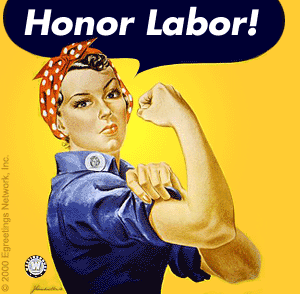 Technology is changing work. It’s changing labor. Some imagine radical transformations, both positive and negatives. Words like robots and drones conjure up all sorts of science fiction imagination. But many of the transformations that are underway are far more mundane and, yet, phenomenally disruptive, especially for those who are struggling to figure out their place in this new ecosystem. Disruption, a term of endearment in the tech industry, sends shutters down the spine of many, from those whose privilege exists because of the status quo to those who are struggling to put bread on the table.
Technology is changing work. It’s changing labor. Some imagine radical transformations, both positive and negatives. Words like robots and drones conjure up all sorts of science fiction imagination. But many of the transformations that are underway are far more mundane and, yet, phenomenally disruptive, especially for those who are struggling to figure out their place in this new ecosystem. Disruption, a term of endearment in the tech industry, sends shutters down the spine of many, from those whose privilege exists because of the status quo to those who are struggling to put bread on the table.
A group of us at Data & Society decided to examine various different emergent disruptions that affect the future of work. Thanks to tremendous support from the Open Society Foundations, we’ve produced five working papers that help frame various issues at play. We’re happy to share them with you today.
- Understanding Intelligent Systems unpacks the science fiction stories of robots to look at the various ways in which intelligent systems are being integrated into the workforce in both protective and problematic ways. Much of what’s at stake in this domain stems from people’s conflicting values regarding robots, drones, and other intelligent systems.
- Technologically Mediated Artisanal Production considers the disruptions introduced by 3D printing and “maker culture,” as the very act of physical production begins to shift from large-scale manufacturing to localized creation. The implications for the workforce are profound, but there are other huge potential shifts here, ranging from positive possibilities like democratizing design to more disconcerting concerns like increased environmental costs.
- Networked Employment Discrimination examines the automation of hiring and the implications this has on those seeking jobs. The issues addressed here range from the ways in which algorithms automatically exclude applicants based on keywords to the ways in which people are dismissed for not having the right networks.
- Workplace Surveillance traces the history of efforts to using tracking technologies to increase efficiency and measure productivity while decreasing risks for employers. As new technologies come into the workplace to enable new forms of surveillance, a whole host of ethical and economic questions emerge.
- Understanding Fair Labor Practices in a Networked Age dives into the question of what collective bargaining and labor protections look like when work is no longer cleanly delineated, bounded, or structured within an organization, such as those engaged in peer economy work. Far from being an easy issue, we seek to show the complexity of trying to get at fair labor in today’s economy.
Each of these documents provides a framework for understanding the issues at play while also highlighting the variety of questions that go unanswered. We hope that these will provide a foundation for those trying to better understand these issues and we see this as just the beginning of much needed work in these areas. As we were working on these papers, we were delighted to see a wide variety of investigative journalism into these issues and we hope that much more work is done to better understand the social and cultural dimensions of these technological shifts. We look forward to doing more work in this area and would love to hear feedback from others, including references to other work and efforts to address these issues. Feel free to contact us at feedback@datasociety.net
(All five papers were authored by a combination of Alex Rosenblat, Tamara Kneese, and danah boyd; author order varies by document. This work was supported by the Open Society Foundations and is part of ongoing efforts at Data & Society to better understand the Future of Labor.)
(Photo by David Blaine.)
 I’ve been scratching my head trying to think about how to understand the different facets of labor that are shaping contemporary life. I don’t have good answers; I only have some provocations and a few questions, but I would love to hear your thoughts.
I’ve been scratching my head trying to think about how to understand the different facets of labor that are shaping contemporary life. I don’t have good answers; I only have some provocations and a few questions, but I would love to hear your thoughts. Networked technologies – including the internet, mobile phones, and social media – alter how information flows and how people communicate. There is little doubt that technology is increasingly playing a role in the practices and processes surrounding human trafficking: the illegal trade of people for commercial sexual exploitation, forced labor, and other forms of modern-day slavery. Yet, little is known about costs and benefits of technology’s role. We do not know if there are more human trafficking victims as a result of technology, nor do we know if law enforcement can identify perpetrators better as a result of the traces that they leave. One thing that we do know is that technology makes many aspects of human trafficking more visible and more traceable, for better and for worse. Focusing on whether technology is good or bad misses the point; it is here to stay and it is imperative that we understand the role that it is playing. More importantly, we need to develop innovative ways of using technology to address the horrors of human trafficking.
Networked technologies – including the internet, mobile phones, and social media – alter how information flows and how people communicate. There is little doubt that technology is increasingly playing a role in the practices and processes surrounding human trafficking: the illegal trade of people for commercial sexual exploitation, forced labor, and other forms of modern-day slavery. Yet, little is known about costs and benefits of technology’s role. We do not know if there are more human trafficking victims as a result of technology, nor do we know if law enforcement can identify perpetrators better as a result of the traces that they leave. One thing that we do know is that technology makes many aspects of human trafficking more visible and more traceable, for better and for worse. Focusing on whether technology is good or bad misses the point; it is here to stay and it is imperative that we understand the role that it is playing. More importantly, we need to develop innovative ways of using technology to address the horrors of human trafficking.